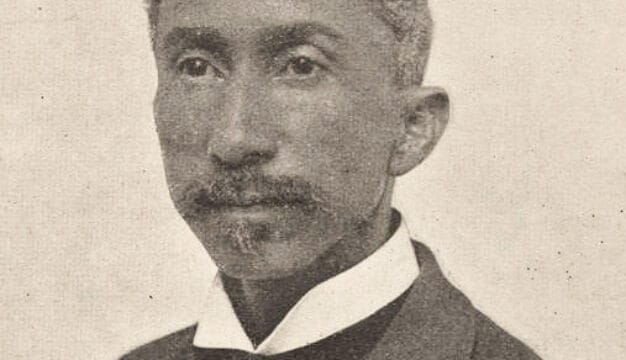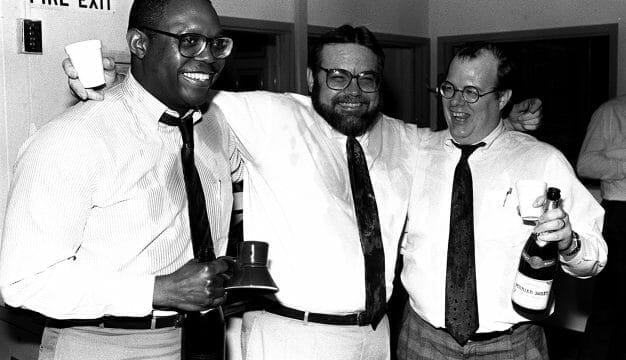Gessner T. McCorvey
Gessner Tutwiler McCorvey (1882-1965) was a prominent attorney who practiced in Mobile, Mobile County, and longtime chair of the state Democratic Executive Committee. In that position, McCorvey helped lead the “Dixiecrat Revolt,” in which many southern Democrats left then national party over its support for civil rights in 1948. As a member of the University of Alabama Board of Trustees, McCorvey also fought integration at the university in 1956 and 1963.
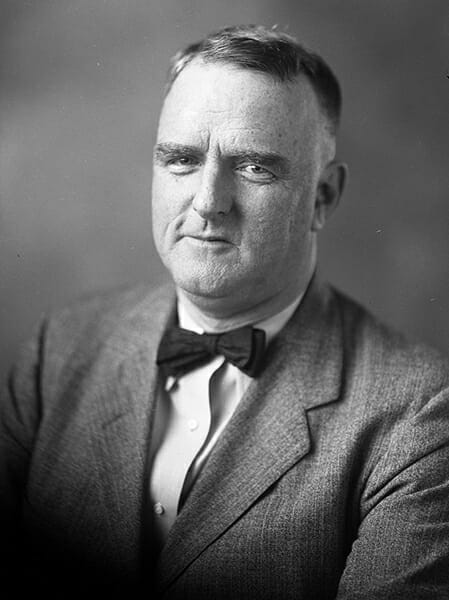 Gessner T. McCorvey
Gessner McCorvey was born in the community of Green Springs, Hale County, on August 26, 1882, to Netta Tutwiler McCorvey and Thomas Chalmers McCorvey; he had four siblings. His mother was the sister of Julia Tutwiler, noted educator and prison reformer, and his father was the first chair of the department of history and moral philosophy at the University of Alabama (UA) in Tuscaloosa, Tuscaloosa County. Through his father, McCorvey became steeped in the views of an earlier generation, particularly those of the Alabama Bourbons, who ardently opposed Reconstruction and supported white supremacy. McCorvey received his preparatory education at Tuscaloosa’s Verner Military Institute and received his undergraduate degree from UA in 1902. He earned a law degree from UA in 1903, was admitted to the state bar, and moved to Mobile, where he became a clerk in the law office of Stevens and Lyons. McCorvey rose quickly in the firm, soon naming among his clients some of the region’s largest railroad and shipping companies. McCorvey married Emily Gray in 1917, and the couple would have three daughters.
Gessner T. McCorvey
Gessner McCorvey was born in the community of Green Springs, Hale County, on August 26, 1882, to Netta Tutwiler McCorvey and Thomas Chalmers McCorvey; he had four siblings. His mother was the sister of Julia Tutwiler, noted educator and prison reformer, and his father was the first chair of the department of history and moral philosophy at the University of Alabama (UA) in Tuscaloosa, Tuscaloosa County. Through his father, McCorvey became steeped in the views of an earlier generation, particularly those of the Alabama Bourbons, who ardently opposed Reconstruction and supported white supremacy. McCorvey received his preparatory education at Tuscaloosa’s Verner Military Institute and received his undergraduate degree from UA in 1902. He earned a law degree from UA in 1903, was admitted to the state bar, and moved to Mobile, where he became a clerk in the law office of Stevens and Lyons. McCorvey rose quickly in the firm, soon naming among his clients some of the region’s largest railroad and shipping companies. McCorvey married Emily Gray in 1917, and the couple would have three daughters.
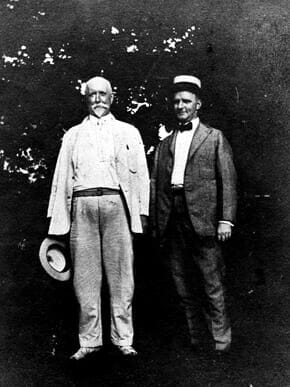 Thomas C. and Gessner T. McCorvey
Beginning in the 1920s, McCorvey emerged as an important political figure. In 1923, he was appointed to the UA Board of Trustees. A few years later, he lent his legal skills to the defense of several prominent Mobilians, including future congressman Frank W. Boykin, who were accused of violating Prohibition laws. McCorvey and the other attorneys won the men acquittals in the high-profile case brought by Hugo Black, who was soon to represent Alabama in the U.S. Senate. Later, during the Great Depression, Gov. Benjamin Meek Miller appointed McCorvey to serve on the Alabama Relief Administration, a committee charged with helping steer federal assistance to Alabama counties. The position earned McCorvey widespread recognition throughout the state, leading to other political opportunities. McCorvey’s most public role during this period came in 1939, when he was elected chair of the state Democratic Executive Committee. During his 12-year tenure, McCorvey transformed the position into one of the most powerful in the state, using it to promote states’ rights and pro-segregation Democratic candidates who shared his conservative views on social issues and economics.
Thomas C. and Gessner T. McCorvey
Beginning in the 1920s, McCorvey emerged as an important political figure. In 1923, he was appointed to the UA Board of Trustees. A few years later, he lent his legal skills to the defense of several prominent Mobilians, including future congressman Frank W. Boykin, who were accused of violating Prohibition laws. McCorvey and the other attorneys won the men acquittals in the high-profile case brought by Hugo Black, who was soon to represent Alabama in the U.S. Senate. Later, during the Great Depression, Gov. Benjamin Meek Miller appointed McCorvey to serve on the Alabama Relief Administration, a committee charged with helping steer federal assistance to Alabama counties. The position earned McCorvey widespread recognition throughout the state, leading to other political opportunities. McCorvey’s most public role during this period came in 1939, when he was elected chair of the state Democratic Executive Committee. During his 12-year tenure, McCorvey transformed the position into one of the most powerful in the state, using it to promote states’ rights and pro-segregation Democratic candidates who shared his conservative views on social issues and economics.
By the mid-1940s, the rift between conservative southern Democrats like McCorvey and the national party leadership widened over the southerners’ opposition to civil rights reforms and Pres. Franklin D. Roosevelt’s New Deal policies. During this time, McCorvey emerged as a leader of Alabama’s states’ rights movement. In 1946, with Geneva County representative Elmo C. Boswell, he helped draft a constitutional amendment to negate the Supreme Court’s 1944 Smith v. Allwright decision, which outlawed the common practice of holding “white’s only” primary elections. The Boswell Amendment, as it was known, required potential voters to “understand and explain” any section of the U.S. Constitution to the satisfaction of a county registrar before being allowed to register to vote. With McCorvey’s strong support, it became state law in November 1946 and enabled white registrars to ask especially difficult questions of blacks and poor whites to disqualify them. The law was declared unconstitutional by a U.S. District Court in 1949, and another attempt to curtail voting rights by McCorvey was defeated in the legislature.
Most notably, it was McCorvey who led the walkout of the Alabama delegation to the 1948 Democratic National Convention in protest of Democratic presidential candidate Harry S. Truman and the national party’s support for civil rights. The group formed the State’s Rights Democratic Party, known popularly as Dixiecrats, and a few months later, McCorvey gave the opening address at the Dixiecrat convention in Birmingham. Despite their fervor, the Dixiecrats failed to alter the course of the 1948 election and stall progress toward racial equality, winning only the states of Alabama, Louisiana, Mississippi, and South Carolina.
In 1951, McCorvey was ousted from his chairmanship of the state party. His successor was Ben Ray, a Birmingham lawyer and leader of those Alabama Democrats who continued to support the national party. In one of his last speeches before the committee, McCorvey pledged that he would boycott the 1952 presidential election because he could not support the reelection of Harry Truman. Privately, McCorvey raised money and distributed campaign material for the Republican nominee, Gen. Dwight Eisenhower, who ultimately defeated the eventual Democratic candidate Adlai Stevenson.
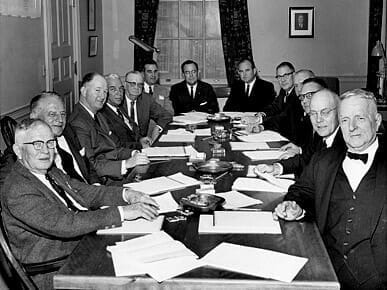 McCorvey and UA Trustees
In addition to his political activity, McCorvey was a member of the University of Alabama Board of Trustees from 1923 to 1964. He took an active role in the school’s two highest-profile desegregation incidents, first, working with the other trustees to expel African American student Autherine Lucy in 1956 to avoid integration. He later led the board as president pro tempore in 1963 supporting Gov. George Wallace‘s “Stand in the Schoolhouse Door.” The school ultimately acquiesced to a federal court that ordered the university to admit African Americans James Hood and Vivian Malone.
McCorvey and UA Trustees
In addition to his political activity, McCorvey was a member of the University of Alabama Board of Trustees from 1923 to 1964. He took an active role in the school’s two highest-profile desegregation incidents, first, working with the other trustees to expel African American student Autherine Lucy in 1956 to avoid integration. He later led the board as president pro tempore in 1963 supporting Gov. George Wallace‘s “Stand in the Schoolhouse Door.” The school ultimately acquiesced to a federal court that ordered the university to admit African Americans James Hood and Vivian Malone.
Gessner T. McCorvey died on August 27, 1965, one day after his 83rd birthday. He is buried in Mobile’s Pine Crest Cemetery.
Additional Resources
Barnard, William D. Dixiecrats and Democrats: Alabama Politics, 1942-1950. Tuscaloosa: University of Alabama Press, 1974.
Frederickson, Kari. The Dixiecrat Revolt and the End of the Solid South, 1932-1968. Chapel Hill: University of North Carolina Press, 2001.
Kirkland, Scotty E. “Mobile and the Boswell Amendment.” Alabama Review 65 (July 2012): 205-49.
State Democratic Executive Committee Records, Gessner T. McCorvey Administration, 1939-1951, Subgroups XXIII – XXV, Alabama Department of Archives and History, Montgomery, Alabama.
